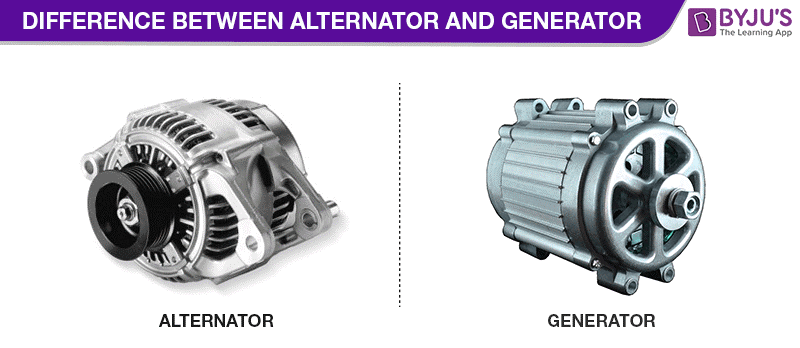Difference between the alternator and generator is given here, which explains how they are different from each other with respect to structure, output, efficiency, etc. These alternator and generator differences can help to clear any doubt regarding this topic. Here, the main alternator and generator differences in tabular form are given for easy understanding.

Before starting with the differences, it is important to know what a generator is and how it works. In simple words, generators and alternators are both mechanical devices that convert mechanical energy to electrical energy. To learn more about them, visit the following articles.
| The Electric Generator |
| AC Generator |
Difference between Alternator and Generator
| Sl. No. | Differentiating Property | Alternator | Generator |
|---|---|---|---|
| 1 | Definition | An alternator is a device that converts mechanical energy into AC electrical energy. | A generator is a mechanical device which converts mechanical energy to either AC or DC electrical energy. |
| 2 | Output Current | An alternator always induces an alternating current. | A generator can generate either alternating or direct current. |
| 3 | Energy Efficiency | Alternators are very efficient. | Generators are considered less efficient. |
| 4 | Output | Alternators have a higher output than generators. | Generators have a lower output when compared with an alternator. |
| 5 | Energy Conservation | Alternators use only the required amount of energy and thus, it conserves more energy. | Generators use all the energy that is produced, so they conserve less energy. |
| 6 | Polarization After Installation | Polarization is not required in the case of alternators. | Generators need to be polarized after installation. |
| 7 | Magnetic Field | The magnetic field is rotating inside the stator of an alternator. | In the case of a generator, the magnetic field is stationary or fixed where the armature winding spins. |
| 8 | Armature Movement | The armature of an alternator is stationary. | The armature of a generator is rotating. |
| 9 | Input Supply | The alternator takes input supply from the stator. | The generator takes the input supply from the rotor. |
| 10 | RPM (Rotation Per Minute) Range | Alternators have a wide range of RPM. | Generators have a low range of RPM. |
| 11 | Voltage Generation | Alternators produce voltage only when needed. | Generators produce voltage at all times. |
| 12 | Size | Alternators are generally smaller in size. | Generators are larger and require more space to fit in. |
| 13 | Brush Efficiency | The brushes of alternators last longer. | The brushes of generators last lesser when compared to an alternator. |
| 14 | Charging of a Dead Battery | Alternators will never charge a dead battery. | A generator can be used for charging a dead battery. |
| 15 | Uses | Alternators are mainly used in the automobile industry as a charging system for the battery. | Generators are widely used to produce large-scale electricity. |
These are the main differences between alternators and generators. These alternators and generator differences are a bit in-depth to help the students get a complete idea about them. These detailed and advanced comparisons can help the students to get completely thorough with these respective topics.
This comparison can also help engineering aspirants to get acquainted with these concepts. To get more such detailed comparisons and differences, keep visiting BYJU’S.
Frequently Asked Questions – FAQs
How to reduce the eddy current losses??
The eddy current losses can be reduced by laminating the core and insulating it from each other with the help of either a paper or a varnish.
What are the advantages of the stationary armature and rotating field system?
The following are the advantages of the stationary armature and rotating field system:
- The installation of stationary armature coils becomes easy.
- The peripheral speed can be achieved easily.
- The number of slip rings used is two.
What are the advantages of the stationary armature and rotating field in an AC generator?
Following are the three advantages of the stationary armature and rotating field in an AC generator:
- Collecting output becomes easy from the stationary armature.
- The stationary armature can be used with higher voltage.
- When the armature is stationary, it becomes easy to supply low-voltage excitation to the rotor through the slip rings.
What are the advantages of parallel operations of alternators?
The following are the advantages of parallel operations of alternators:
- In case of breakdown of an alternator at the production place, the parallel operations make sure that the connection is continuous to its consumers.
- This arrangement of alternators makes the operation efficient. Also, it is considered to be economical.
- The installation of more alternators in times of requirement becomes easy as the other alternators are arranged parallel to each other.
- The arrangement helps in meeting the requirement of a large alternator through multiple alternators and their arrangement in parallel operation.
What are the losses in a generator?
The following are the losses in a generator:
- Friction loss
- Windage loss
- Rotor copper loss
- Stator copper loss
- Stator iron loss
Faraday’s Law of Electromagnetic Induction Explained


Comments